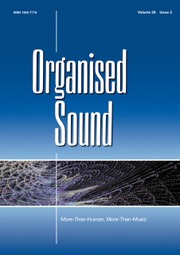Crossref Citations
This article has been cited by the following publications. This list is generated based on data provided by
Crossref.
Hogg, Bennett
and
Sansom, Matthew
2015.
Perspectives from Practice.
Contemporary Music Review,
Vol. 34,
Issue. 4,
p.
259.
Gallagher, Michael
2015.
Field recording and the sounding of spaces.
Environment and Planning D: Society and Space,
Vol. 33,
Issue. 3,
p.
560.
Gallagher, Michael
2015.
Landscape AudioIn Situ.
Contemporary Music Review,
Vol. 34,
Issue. 4,
p.
316.
Smith, Jacob
2016.
The chance meeting of a goose and a plover on a turntable: Chris Watson’s wildlife sound recordings.
Sound Studies,
Vol. 2,
Issue. 2,
p.
151.
Bruyn, Ben De
2016.
Anthropocene Audio: The Animal Soundtrack of the Contemporary Novel.
Critique: Studies in Contemporary Fiction,
Vol. 57,
Issue. 2,
p.
151.
Browning, Joseph
2021.
Sound and More-than-Human Sociality in Catherine Clover’sOh! Ah ah pree trra trra.
Organised Sound,
Vol. 26,
Issue. 2,
p.
179.
SUNOUCHI, Motohiro
and
YOSHIOKA, Masaharu
2021.
Diversity-Robust Acoustic Feature Signatures Based on Multiscale Fractal Dimension for Similarity Search of Environmental Sounds.
IEICE Transactions on Information and Systems,
Vol. E104.D,
Issue. 10,
p.
1734.
Vella, Kellie
Esteban, Michael
Ploderer, Bernd
and
Brereton, Margot
2022.
Networked Gardens: Remediating Local Nature Data Through the Internet of Things.
p.
1597.
Guzy, Maciej
2022.
Bernie Krause i jego dźwiękowe archiwa. Między dziką naturą a ucieleśnioną relacją.
Przegląd Kulturoznawczy,
p.
1.
Kanngieser, A. M.
2023.
Sonic colonialities: Listening, dispossession, and the (re)making of Anglo‐European nature.
Transactions of the Institute of British Geographers,
Vol. 48,
Issue. 4,
p.
690.


